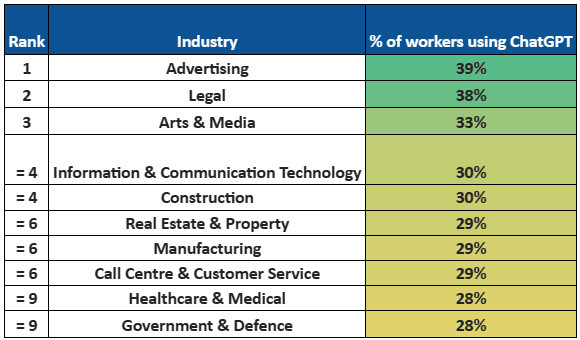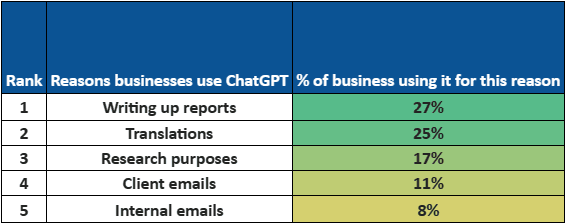The surge in artificial intelligence pursuit since ChatGPT's November launch has propelled the technology's popularity by 1,700%. With over 100 million users, the debate on ChatGPT's role in the workplace intensifies. Indusface's survey of 2,000 UK workers sheds light on the AI's integration across industries, revealing key sectors, applications, and the prevalent trust concerns.
Since its launch last November, ChatGPT has not only garnered over 100 million users but has also ignited a 1,700% surge in the quest for artificial intelligence. The debate over its role within workplaces has reached a crescendo. To better understand ChatGPT's footprint in the UK business landscape, Indusface conducted a comprehensive survey of 2,000 workers, offering insights into its adoption, applications, and the prevailing concerns.
Venky Sundar, Founder and President of Indusface, says:
“Specific to business documents the risks are: legal clauses have a lot of subjectivity, and it is always better to get these vetted by an expert. The second risk is when you share proprietary information into chatGPT and there’s always a risk that this data is available for the general public, and you may lose your IP. So never ask chatGPT for documentation on proprietary documents including product roadmaps, patents and so on.
The benefits are that a V1 draft could be easily obtained, and it is helpful to frame thoughts especially for generic templates such as email templates and so on. For application security, the risk is, you are unsure that the code snippets written by ChatGPT are secure. You will still need to perform in-depth security testing before deploying them.
The maturity level of addressing the data and ownership of trust is still not well defined and the businesses are right in not trusting it completely as they are worried about the use or more appropriately misuse of their data. Like every technology, there will be early adopters, but these people are tech savvy and a minority. For everyone to adopt, it will take its own time.
ChatGPT or LLMs in general have made the development cycles very short. It is easier now to convert an idea to a working proof of concept in a matter of days when compared to months before."
The Impact Of ChatGPT On Workplace Dynamics: An Indusface Study
The study by Indusface reveals that Advertising is the industry which uses ChatGPT the most on the job, with almost two fifths (39%) of employees admitting to using it for work. Among them, 11% admit to using it frequently, more than once a week.

Only slightly more than 5% of people working in the industry said they will never use ChatGPT, showing a more welcoming and open-minded attitude towards applying ChatGPT within the advertising industry.
Businesses within the Legal sector rank as the second industry using ChatGPT the most. 38% of legal workers surveyed admit to using ChatGPT or alternative methods of AI for work. This is perhaps unsurprising since recent reports show that AI is reshaping the legal industry by improving contract efficiency and automation.
Arts & Media comes in third place, with 33% of workers within the sector admitting to using ChatGPT for their work.
According to the findings, art workers are applying AI to their work more frequently than any other industry within the top 10, with over 13% admitting to using it at least once a week.
The survey identifies writing reports (27%) as the most common reason for using ChatGPT at work, followed by translations (25%) and research purposes (17%). Surprisingly, internal and client emails rank lower in utilization at 8% and 11%, respectively. These findings underscore the technology's impact on streamlining document-related tasks.

As businesses grapple with the integration of AI tools like ChatGPT, the road to widespread adoption requires navigating trust issues, security concerns, and a careful consideration of use cases. The accelerated development cycles facilitated by AI must be tempered with a judicious approach, ensuring that early adoption doesn't compromise application security and data privacy. The journey towards seamless AI integration demands a meticulous separation of knowledge bases for productivity and defense use cases, fostering continuous training and updates for sustained trust and reliability.